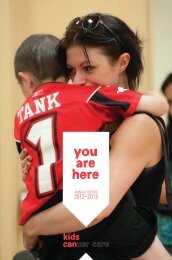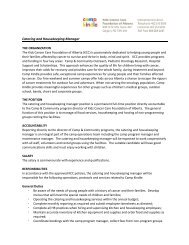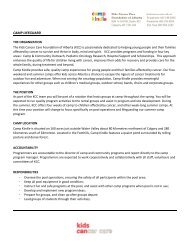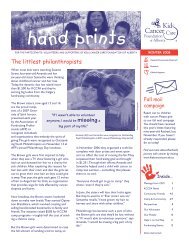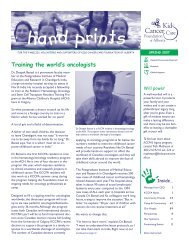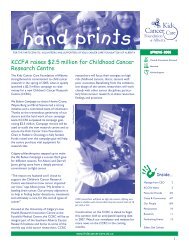2006/07 ann ual report - Kids Cancer Care
2006/07 ann ual report - Kids Cancer Care
2006/07 ann ual report - Kids Cancer Care
Create successful ePaper yourself
Turn your PDF publications into a flip-book with our unique Google optimized e-Paper software.
clinical support<br />
M usic offers children relief from painful<br />
chemotherapy and radiation treatments. And even<br />
when treatment shifts from curative to palliative,<br />
music has its place.<br />
8<br />
to feel good<br />
Above left: Makayla enjoys a song with music therapist<br />
Trina Nestibo.<br />
Above right: <strong>Kids</strong> like Avi<strong>ann</strong>a and their families enjoy<br />
the best hospital care thanks to KCCFA’s Clinical Support<br />
program (photo by Don Molyneaux).<br />
Opposite right: Music brings a smile to Makayla at<br />
the Alberta Children’s Hospital, offering her a reprieve<br />
from rigorous cancer treatments.<br />
Sound health<br />
Hospitals. A place of quiet and rest.<br />
Normally a minstrel wandering<br />
the halls with tambourines and<br />
castanets would attract the<br />
attention of security. But on the<br />
oncology ward at the Alberta<br />
Children’s Hospital music therapist<br />
Trina Nestibo and her cart of<br />
musical instruments are a welcome<br />
part of the healing regime.<br />
Funded through KCCFA’s Clinical<br />
Support program, Trina’s music<br />
sessions are designed to support<br />
healing at all levels—emotional,<br />
physical and spirit<strong>ual</strong>. Research<br />
suggests that music lowers blood<br />
pressure, enhances the body’s own<br />
immune responses and reduces<br />
anxiety among cancer patients.<br />
Some oncologists prescribe it as a<br />
complement to medical treatments.<br />
Music therapy takes different forms:<br />
sometimes a child prefers to listen,<br />
while others sing, compose, play<br />
instruments, or even record CDs.<br />
“These sessions provide an outlet<br />
for self-expression,” says Trina.<br />
“Music helps kids feel better,<br />
so they start to see themselves<br />
differently—not just as cancer<br />
patients.”<br />
Music offers children relief from<br />
painful chemotherapy and radiation<br />
treatments. And even when<br />
treatment shifts from curative to<br />
palliative, music has its place.<br />
Trina recalls 10-year-old Jeffery:<br />
“He loved The Bear Went Over the<br />
Mountain. We sang that song every<br />
week for a year,” each time pausing<br />
just before the bear peered over<br />
the mountain, so Jeff could reveal<br />
what the bear could see. Us<strong>ual</strong>ly<br />
the bear saw everyday things—a<br />
picnic table, a lake, a blueberry pie.<br />
But one day, Jeff revealed, the bear<br />
saw a tunnel of light. “Only the one<br />
time,” Trina says, “but it showed me<br />
he was at peace with his journey.”<br />
Jeff died shortly after. Trina won’t<br />
forget the music they made<br />
together.



